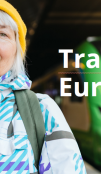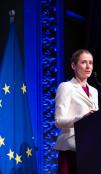European Union supports innovative solutions for climate change in Kazakhstan

In 48 hours, the Hackathon participants came up with their innovative ideas and projects in the following areas: innovations, digitalisation, high technologies, green tech, green finance, clean tech, 4th industrial revolution, climate change, new industries, sustainability.
Ambassador of the European Union to Kazakhstan Kestutis Jankauskas: “The aim of our Hackathon is to foster green innovations and sustainable projects among Kazakhstani society. We hope that during these two days, the participants gained valuable experience and skills, which will help them to build a successful startups and make this world much better place”.
In total 12 projects have been submitted at the Ecohackathon. The jury has selected three best teams:
The Farmer team. The project relates to the recycling of food waste into natural fertiliser. The participants developed three steps to effectively implement their idea: collection of food waste, processing of food waste into fertilizer and concentrate, and then selling the fertilizer and providing a food waste collection service.
The Lio team. This is a mobile eco-app that helps to complete personal goals as a calendar, and the reward for meeting personal goals is the planting of one tree by Team Lio. The project will be subscription based and the trees will be purchased through advertising on the app.
Ecomenu team. The project aims to reduce paper menus and cheques in restaurants. Ecomenu is a platform where restaurateurs can upload a menu in electronic format and visitors can see it by moving their phone camera over a QR code.
The winners will visit Estonia with a study trip this autumn to learn the European experience in IT and start-up industry.
“Estonia is one of the most digitalized countries in Europe and the world. I am glad that the winners will get acquainted with Estonian ICT and startup community. IT is a great enabler of change and I hope that the best solutions that had been developed during the hackathon will find a way to be implemented”, said Toomas Tirs, Ambassador of Estonia to Kazakhstan.
Throughout the Hackathon, the participants also received the assistance of technical, industry and business experts, learned from the experience of successful start-up founders and had a training on waste management and recycling.
Alim Khamitov, partner of the event and CEO of the MOST business incubator, said that the event was a bright spot for the city and the local start-up ecosystem: "With the pandemic coming, such large-scale events have hardly been organised in the city. Thanks to the EU initiative, we could give a boost to talented young people who showed their skills in action. Participants moved from idea to prototype and presented working solutions to the jury. I hope that the students gained practical knowledge from the mentors and speakers, and that the winners will return from their trip with new knowledge”.
All the participants received the certificates of appreciation. In addition, the EU Delegation and Embassies of EU countries in Kazakhstan presented the valuable prizes for the winners. The "Best Idea" nomination was won by Team Piper with its recycled plastic clothing brand, the "Innovative Solution" nomination by Team Zhasyl with its eco-friendly product marketplace and the "Effective Marketing Strategy" nomination was won by Team Eco Challenge with its free online eco-courses for children. The event also featured the digital art performance of the Kazakh artist Alpamys Batyrov, organized by the event partner Keremet Art gallery.
EU EcoHackathon was supported by the Estonian Embassy in Kazakhstan, International IT University (Nurzhan Duzbayev), MOST, IBC Group (Kurmet Aubakirov), Eco Network (Anna Gudarzi), Kurmet Aubakirov Private Foundation, Almaty City Akimat and Atameken National Chamber of Entrepreneurs.
For more information please contact:
Elnura Abakanova, Communication Officer, EU Delegation to Kazakhstan: Elnura.abakanova@eeas.europa.eu
#EU4GreenKZ #EcoHackEU




